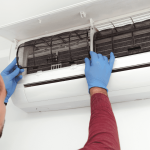
HVAC Best Practices: Mythbusters Edition
You hear it all the time: “Don’t believe everything you see on the Internet.” But when it is really hot out, some of those lifehack TikToks and viral blog posts can be so tempting to try.
We’re here to bust a few of the most common cooling myths and share some HVAC best practices that will actually help you save money and keep cool.
Cooling Myth #1: Turn the air conditioning off when you’re not home
It sounds reasonable that turning off the air conditioning unit while you are away will help save money and conserve energy. But it’s actually just the opposite! Unlike lightbulbs, an air conditioning unit requires a large amount of energy to restart after being fully shut off. Humidity can build up and rise to an uncomfortable level throughout the house without consistent air circulation. This causes damage to the internal parts of your system and increases your electric bill as the unit is forced to work harder and less efficiently for a longer period of time.
The solution? You can save as much as 10 percent a year on heating and cooling bills by setting your thermostat seven to 10 degrees higher when you are asleep or away from home. Consider installing a programmable thermostat or an HVAC system with variable speed technology to make this practice automatic and give you full scheduling control without sacrificing comfort. Variable speed technology systems are an efficient and cost-effective solution, enabling the HVAC system to run at a variety of speeds to precisely control the heated or cooled air in the home, remove moisture and produce better air quality.
Cooling Myth #2: Fans lower the temperature of a room
Fans can be a great way to keep you and your family feeling comfortable in the warm summer months, and allow you to set the thermostat about four degrees warmer without feeling a noticeable difference. But while turning on the fan makes you feel cooler, it is actually not lowering the temperature of the room. Air conditioning units produce and send cool air into the room, while a ceiling fan only works to circulate the air already in the room. It moves the conditioned air across your skin, evaporating moisture and leaving you feeling cooler.
Because fans cool people and not rooms, turn the fan off when you leave. Circulating the air in an unoccupied room will only waste electricity. Pro tip: To get the most comfort and savings from using your fans, turn the fan around. Most ceiling fans are multi-directional. To keep cool in the summer, set the direction to counterclockwise so the blades will push cooler air down toward you.
Cooling Myth #3: Cranking the temperature down cools the home faster
When a room is too hot, most people’s first instinct is to go to the thermostat and press the button a few (dozen) times. But setting the temperature extremely low has no effect on the speed of cooling and does not kick the air conditioning unit into high gear. As the unit works longer to cool the home, it will waste energy and experience unnecessary strain.
Instead, the best practice is to set the thermostat at one comfortable temperature and let the HVAC system do the rest. To be the most energy efficient, set it at 78 degrees. This may seem a bit warm, especially on those days you think you could fry an egg on the pavement. Utilizing ceiling fans, blocking out sunlight, scheduling regular HVAC maintenance appointments and slowly increasing the temperature of the house as you get used to a warmer indoor setting, you and your family will adjust comfortably. Just remember, most systems are designed to lower your indoor temperature about 20 degrees from the outside. So, if the weather is 100 degrees outside and your system is running at its peak efficiency, your indoor temperature will likely never maintain a level lower than about 80 degrees.
In Florida and South Georgia, it gets hot – a lot. At Barineau Heating and Air, we want to keep your family feeling comfortable and cool. If these best practices are not keeping you cool, call us at 850.580.4029 or schedule an appointment online today.




